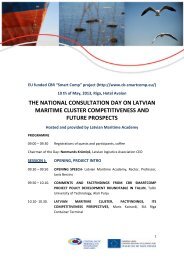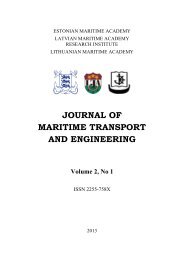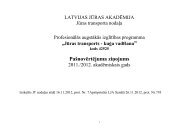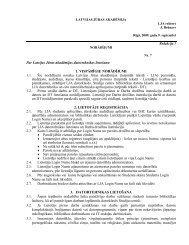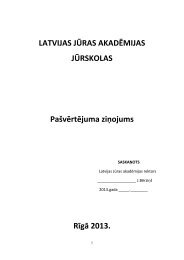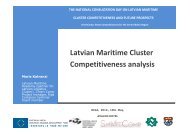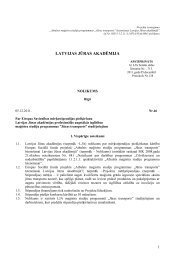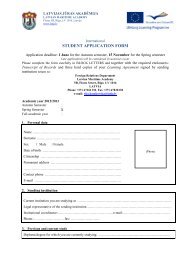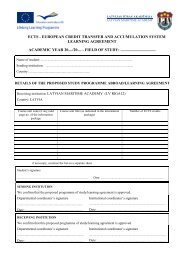Proceedings of 14th International conference „Maritime Transport and Infrastructure - <strong>2012</strong>”INTERNATIONAL WORDS IN MARITIME ENGLISHMarita SausāLatvian Maritime Academy, 5B Flotes St., LV – 1016, Latvia, E-mail: marita.sausa@latja.lvAbstractThe paper analyses the importance of international words in English. Latin has since the earliestperiod of the history of English been one of the principal donor languages in the expansion of theEnglish vocabulary. Intercomprehension based on the understanding of words in several Romancelanguages contributes to effective maritime communications.KEYWORDS: International words, borrowing, intercomprehension.1. International words in EuropeEuropean internationalisms originate primarily from Latin and Greek. Many non-Europeanwords have also become international, often by way of one or more European languages.International words are generated by new inventions, scientific and technological advancesand are spread by speakers of one language living in geographical regions where other languages arespoken.An academy (Gr) is an institution of higher learning, research, or honorary membership. Thename traces back to Plato’s school of philosophy [1], founded approximately 385 BC at Akademia, asanctuary of Athens, the goddess of wisdom and skill.A tsunami (Japanese lit. harbour wave) is a brief series of long, high undulations on thesurface of the sea caused by an earthquake or similar underwater disturbance. These travel at greatspeed and often with sufficient force to inundate the land [1].Navigation is the action of navigating ; the action or practice of passing on water, esp. the sea,in ships or other vessels; sailing 1530s, from L. navigationem (nom. navigatio), from navigatus,pp. of navigare "to sail, sail over, go by sea, steer a ship," from navis "ship" and the root of agere "todrive"[1].Engineer is one who contrives, designs, or invents; an author, designer.The word engineer is derived from the Latin root ingenium, meaning “cleverness” [1]Nautic F. nautique (c1500) or L. nautic-usrelating to ships and sailing[1].Anchor is an appliance for holding a ship, etc., fixed in a particular place, by mooring it to thebottom of the sea or river; now consisting of a heavy iron, composed of a long shank, having a ring atone end to which the cable is fastened OE. ancor, a. L.ancora cogn. with Gr. Bend, crook, whenceEnglish angle [1].These words constitute international scientific vocabulary i.e. a vocabulary of scientific andtechnical words, terms, formulae, and symbols that are almost universally understood by scientists andsimilarly used in at least two languages.2. Conditions for BorrowingThe mere contact of two languages does not necessarily guarantee that one will borrow fromthe other. Speakers must have motives for the borrowing. People usually emulate those whom theyadmire, not only in speech patterns but also in all other respects.[2] Upper class Englishmen, in the108
Proceedings of 14th International conference „Maritime Transport and Infrastructure - <strong>2012</strong>”days after the Norman Conquest learned the French language and used French expressions becauseFrench was the language of the new rulers of the country. The prestige factor leads to extensiveborrowing from the dominant language into the lower language. Another motive for borrowing is theneed filling motive. New experiences, new objects and practices bring new words into the language.Tea, coffee, tobacco, sugar, cocoa, chocolate have spread all over the world, along with the objectthese words refer to. Typhoons and tsunamis have not, but direct or indirect experience connected withthem has.The spread of Christianity into England in the 7 th century carried many Latin words into OldEnglish as cultural loanwords: abbot, pope, cap, sock, etc.Once a borrowed word has come into widespread use, its subsequent history is like that of anyother form in the language. During the period of importation, the shape of the word is subject toadaptation and variation because different borrowers imitate the word in slightly different ways.In the course of history English has come in close contact with many languages, mainly Latin,French and Old Norse (or Scandinavian). However, in spite of Latin, Celtic and Scandinavianinfluence, the general character and vocabulary of Old English in the middle of the eleventh centurywas essentially that what it had been five centuries before, but in 1066 came the Norman conquest, anevent which had more influence on the English language that any other from outside.3. The Effect of Borrowing on the English LanguageIf we base our conclusions on the study of the forms recorded in dictionaries, it is very easy tooverestimate the effect of foreign words. The actual number of native words is extremely smallcompared with the number of foreign borrowings recorded. On the other hand, if we examine spokenEnglish in familiar conversation, we find the proportion reversed. It has been estimated that less thanfifty words, all of them native words, suffice for more than half our needs [3]. The proportion of nativewords to foreign words will naturally vary with the subject matter and any article on scientificknowledge would naturally contain a high percentage of borrowings.Since the general opinion is that English has on the whole benefitted from the adoption of somany foreign words the obvious advantage is the wealth of synonyms which have been created by theadoption of a foreign word.When in two languages we find no trace of the exchange of loanwords one way of the other,we are safe to conclude that these two nations have had nothing to do with each other. But if they havebeen in contact, the number of loan words will inform us of their reciprocal relations, the influencethey have had on each other and in what domains of human activity each has been superior to theother. The study of language proves the fact that when one nation produces something that itsneighbours think worthy of imitation they will take over not only the thing, but also the name. Loanwords are nearly always technical words belonging to one special branch of knowledge or industry,and may be grouped so as to show what each nation has learnt from the other [4].4. The Influence of Latin on EnglishLatin has since the earliest period of the history of English been one of the principal donorlanguages in the expansion of the English vocabulary. A great many of the lexical items which canultimately be traced back to Latin have entered the English language indirectly via French and variousother Romance languages, which together with Latin probably contributed almost two thirds of theword stock of present day English. All through the Middle Ages Latin played an important role as anofficial written language in England. A substantial part of Latin and Greek loans which have survivedto the present day were first introduced as particular terms in science e.g. theory (Gr), praxis (Gr),system (Gr), method (Gr), atmosphere (Gr),radius (L), formula (L), calculus (L), notion (L),concept(L), satellite(L), exist(L), etc. Sometimes quite a number of English words come from just oneLatin root. For example, the Latin word vocare, vocatus vocare - to call; vocatus – called - hasproduced a whole range of words in English vocabulary e.g. provoke, provocative, evoke, evocative,109



